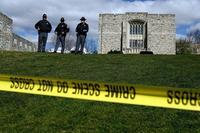-
Four days of rioting strains U.K. legal system

The ongoing unrest in the United Kingdom has begun to strain the country’s criminal justice and law enforcement system; with police arresting hundreds of people over the last few days, local judges have had trouble keeping up with the case load and facilities have quickly become overcrowded
-
-
Emergency alerts for cell phones
Residents living near Austin, Texas can now receive important emergency notifications on their cell phones for free; with more and more individuals switching to cell phones and abandoning their land lines, emergency responders and government officials have been forced to adapt emergency warning systems to connect to cell phones instead
-
-
Sector Report for Tuesday, 9 August 2011: Law Enforcement Technology
This report contains the following stories.
Plus 1 additional story.
-
-
Anonymous hacker collective hits rural law enforcement

In its latest exploit, global hacker collective Anonymous claimed to release ten GB of stolen data from more than seventy rural sheriff’s departments across the United States, leaking sensitive information that could compromise the agencies’ investigations
-
-
DHS "pre-crime" detectors draw criticism
A plan by DHS officials to use automated machines to identify people before they commit a criminal or terrorist act is drawing sharp criticism from privacy advocates; DHS is currently developing intention detectors under the Future Attributer Screening Technology (FAST) program; the FAST security checkpoints are outfitted with a sophisticated suite of sensors that are designed to identify several physiological indicators like heart rate or the steadiness of a person’s gaze
-
-
CrimeView Dashboard helps fight crime in real-time
In an effort to share information in an easily manageable format, the Chesapeake Police Department in Virginia recently implemented the CrimeView Dashboard; CrimeView is a cloud-based software system that allows an entire agency to monitor criminal activity in real-time with maps, charts, and reports
-
-
Hi-tech bus helps catch drunk drivers
With the help of a new $350,000 Breath Alcohol Testing (BAT) bus, police in Lafayette, Louisiana are cracking down on drunk drivers; with the BAT bus, officers have access to five computer stations, three breathalyzers, and a yellow line on the floor for suspected drunk drivers to walk along
-
-
Virginia police go 3D
AREVA, an international nuclear services firm, provided the Central Virginia Crash Team with two 3D scanners that use lasers to reconstruct traffic crashes as well as crime scenes to create accurate, scale models as evidence
-
-
FBI completes new information sharing system
Late last month the FBI completed work on its newest information sharing database that will allow local, state, regional, and other law enforcement agencies across the United States to pool information; with the National Data Exchange (N-Dex), local investigators can now pull up records like incident reports, criminal incarceration records, and similar investigations from across the United States
-
-
Industry: government hampering efforts to fight counterfeit chips

Representatives from the semiconductor industry said that new Treasury Department and U.S. Customs and Border Protection (CBP) policies have made it difficult to assist the Pentagon in its struggle to keep counterfeit computer components out of its supply chain; Brian Toohey, the president of the Semiconductor Industry Association, a lobbying group, said that new policies introduced in 2008 by the Treasury Department and CBP have made it difficult for manufacturers to identify counterfeit products
-
-
New desalination technology to help solve world's water shortage

Over one-third of the world’s population already lives in areas struggling to keep up with the demand for fresh water. By 2025, that number will nearly double; a new study argues that seawater desalination should play an important role in helping combat worldwide fresh water shortages once conservation, reuse, and other methods have been exhausted
-
-
Man purchases FBI, CIA, and Chicago police badges online
Last month a man was arrested after airport screeners at Chicago’s O’Hare International Airport found a Chicago police badge in his baggage; a search of the man’s apartment revealed that he had obtained more than fifty federal, state, and local law enforcement badges from agencies including the Illinois state police, the FBI, the CIA, and the Cook County Sheriff’s Department.
-
-
Virginia Tech lockdown ends, no gunman found

In an attempt to avoid a repeat of the 2007 mass shooting which left thirty-two people dead, officials at Virginia Tech locked down its campus yesterday after receiving a report of a suspicious man who may have been armed; after an exhaustive search by local police that did not yield any results, authorities decided to lift the lockdown
-
-
Researchers show how to unlock, start a car remotely
Two researchers at the Black Hat event in Las Vegas demonstrated they could send commands from a laptop to unlock the doors of a Subaru Outback — and then start the car; they said that in addition to vehicles, many other GPS-tracking devices, 3G security cameras, urban traffic control systems, SCADA sensors, and home controls and systems are also telephony-enabled and, as a result, susceptible to attack
-
-
Napolitano addresses Public Private Partnership conference
DHS secretary Janet Napolitano spoke to the attendees and reiterated the private sector’s role as an important partner in strengthening the homeland security enterprise better to defend against evolving threats, including disasters
-
More headlines
The long view
Why Ukraine’s AI Drones Aren’t a Breakthrough Yet
Machine vision, a form of AI, allows drones to identify and strike targets autonomously. The drones can’t be jammed, and they don’t need continuous monitoring by operators. Despite early hopes, the technology has not yet become a game-changing feature of Ukraine’s battlefield drones. But its time will come.
